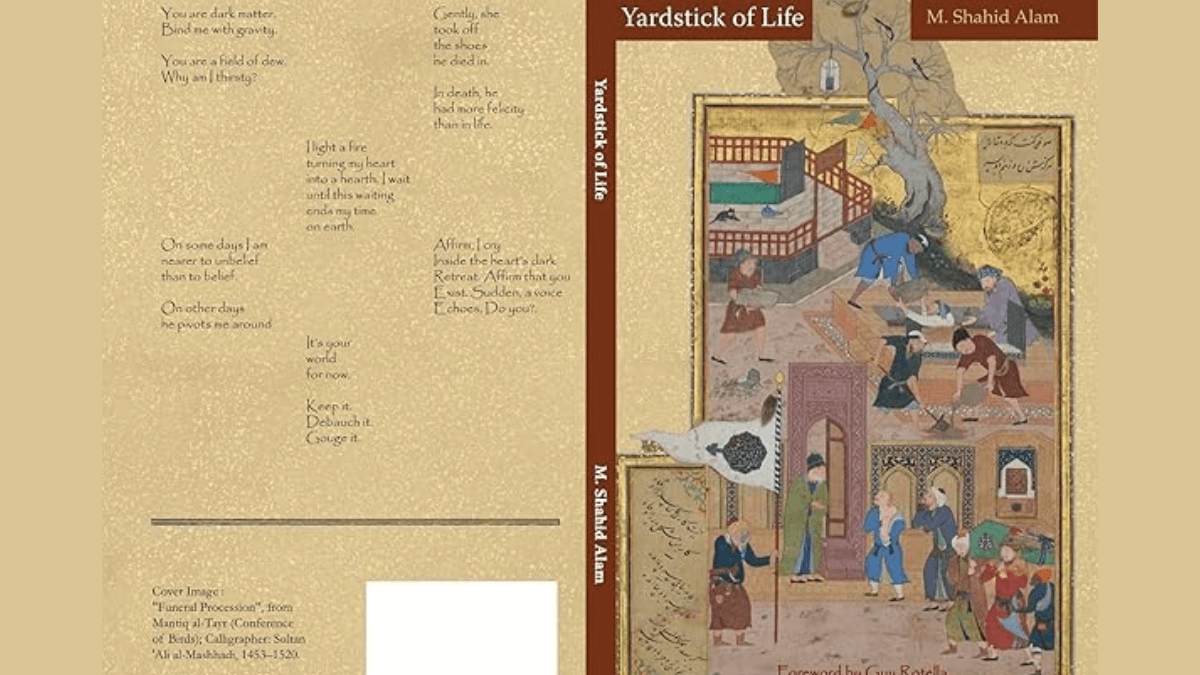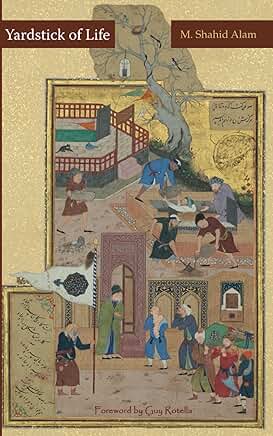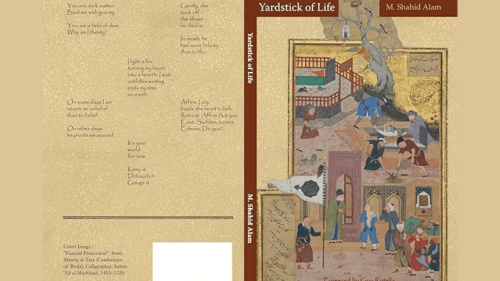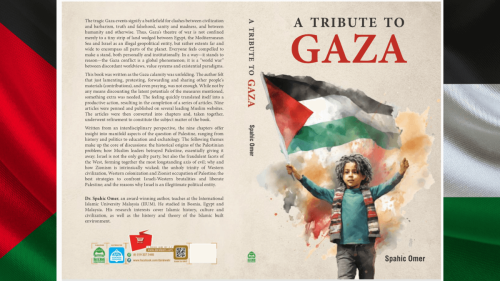Yardstick of Life, by M. Shahid Alam

The title of Shahid Alam’s collection, Yardstick of Life, identifies a major focus of his work, a rigorous concern with measurement in several senses: the ways we measure—and judge or evaluate—life; the way life measures—and judges or evaluates—us (taking our measure); and the ways in which poetry itself, as a measured toolkit or a toolkit of measures, participates in those activities, not least by means of the author’s careful calculation of poetry’s capacities and limits.
At times, the book’s assessments are conclusively direct and confident. This is especially true of a trio of overtly political poems that expose the tricks by which rulers or nations reify their hegemony as if it were inevitable and natural.
In one, Genghis Khan and a U.S. Secretary of State share a self-exonerating tactic; they justify violence as the unwanted but necessary cost of self-defense while eliding the hierarchical assumption that underlies their grim and grimy logic: some lives are worth more than others.
In “America’s Past,” the historical and museum preservation of the artifacts of slaughtered or displaced indigenous peoples is depicted as actually burying (in “crypts” and “vaults”) what it presumably displays, suggesting that the very keeping of records can be a form of appropriation and erasure.
Another, “Holding the Center,” shows how seemingly neutral maps operate as willful instruments of coercion and control, nicely conveying its dissident point in the phrase “the cavalry / Of cartographers.”
For all their shared interest in measurement, many of the poems of Alam’s collection are less concerned with the sort of corrective certitude just described than with more elusive forms of precision, forms in which uncertainty, doubt, and interrogation play a significant and transformative role.
This is in keeping with the mixtures of exactitude and mystery, even mysticism associated with, for instance, the concrete yet eerie mathematics of pi and prime numbers, concepts that are aptly invoked in the volume’s opening poem and help to establish its fundamental approach. It is related as well to the oppositions and mergers of high seriousness and deflating comedy, of elaborate formal patterning and disjunctive surprise familiar in Urdu poetry, especially the ghazal.
Alam first made his mark as a poet with his creative translations of Ghalib, published by Orison Books in 2018, and that great poet’s influence is vital throughout this book. Familiar images from the Urdu poetic tradition (roses, literal and legendary birds, moths and candle flames) are rehearsed and reimagined in several poems, for instance.
More generally, throughout Yardstick of Life, in poems literally labeled as or otherwise recalling gazals, in encounters where religious faith is challenged by or overcomes doubt, in sequences of love songs that explore the vagaries of romantic success and failure, in all of these, strategies of measurement (chronicle, biography, memory, curation, observed likeness or echo) encounter the infinite variety of experience, its refusals of or escape from category and capture.
These intricate measurements are often expressed by technical devices, artfully deployed. Some are traditional: the patterns of rhyme, repetition, stanza shape, and concluding self-reference borrowed from the ghazal. Others are more modern or contemporary, including sleights of meaning enabled by typography or word processing.
In “Thanks,” for instance, two of the obstacles to lasting love, too much intensity and too little, are conflated by a printing ploy: “in(s)anities,” combining excess passion (insanity) with passion’s exhaustion (inanity). In another, words are run together or otherwise combined (“dawnawakeneddolphin”; “rose:lipped rose:browed rose:eyed”) to present a unity of sensation, cognition, and being that language, with its categorical rules and restrictions (grammar, syntax, orthography, and punctuation), otherwise betrays.
As these stratagems suggest, Alam is often concerned with revising ordinary measures, something he frequently accomplishes in poems treating the natural world and human interactions with it.
One poem revises the standard term for bringing branches of flowering shrubs into early bloom (“forcing”), calling it “gentle coaxing” instead. Another uses the unpredictability of bird song to teach us to be wholly pleased by less than the full measure of a plenitude we too often forcefully insist on. In number VIII of a set of ten ghazals, loss, seemingly made inevitable by repetition, is nonetheless transformed into persistence. In one poem of the sequence called “Six Days of Spring,” even sobriety and joy prove interchangeable.
Of all the subjects this book takes up, time, with its repertoire of life-narrowing threat (death) and life-enhancing expansiveness (the grace of living), is perhaps the most insistent and central (no surprise, since time is an abstract and relative thing we measure as it measures us).
The book’s varied reactions to time, ranging from despair to joy and including efforts both faithful and mistrusted to transcend it (see “Nirvana”), are among the collection’s greatest pleasures.
Other readers will find other things to admire. For me, the most moving moments in Yardstick of Life are those timeful, lasting ones that invoke the quiet mysteries of family life, and do so in ways that, to say it yet again, revise the conventional categories by which experience is usually meted out or measured.
In one, a mother at prayer amid ordinary household tasks enacts the interpenetration of the eternal and the quotidian or commonplace, dissolving, at least momentarily, the standard conception of an unbridgeable gap between them.
In another, a father learning to care for an infant son discovers that constraint can liberate rather than, as is usually thought, enslave, a discovery that transforms the child’s demands into gifts and makes burdens pleasures. In such poems earthbound measurement expands to encompass the possibility of spirit.
Reviewed by Dr. Guy Rotella, Professor Emeritus of English Literature, Northeastern University, Boston.
 Dr. M. Shahid Alam's poems charm through their wit, and satisfy through their insights into the paradoxes of the human condition. The influence of the Urdu and Persian literary traditions is most apparent, but other influences make themselves felt as well, including—perhaps surprisingly—the language-molding of Paul Celan and the plainspoken domesticity of William Carlos Williams. These lively poems of love, socio-political critique, nature, and the spirit reward the reader again and again. Available at Amazon.
Dr. M. Shahid Alam's poems charm through their wit, and satisfy through their insights into the paradoxes of the human condition. The influence of the Urdu and Persian literary traditions is most apparent, but other influences make themselves felt as well, including—perhaps surprisingly—the language-molding of Paul Celan and the plainspoken domesticity of William Carlos Williams. These lively poems of love, socio-political critique, nature, and the spirit reward the reader again and again. Available at Amazon.
Topics: Book Review, Islamic Culture And Civilization, Poetry
Related Suggestions

















